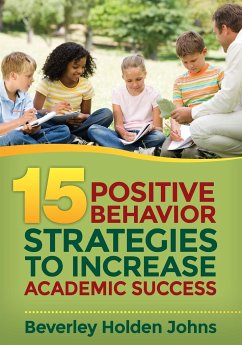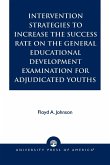Beverley Holden Johns
Fifteen Positive Behavior Strategies to Increase Academic Success
Beverley Holden Johns
Fifteen Positive Behavior Strategies to Increase Academic Success
- Broschiertes Buch
- Merkliste
- Auf die Merkliste
- Bewerten Bewerten
- Teilen
- Produkt teilen
- Produkterinnerung
- Produkterinnerung
Powerful behavioral interventions to help your students succeed Behavioral problems can di
Andere Kunden interessierten sich auch für
![Implementing Positive Behavior Support Systems in Early Childhood and Elementary Settings Implementing Positive Behavior Support Systems in Early Childhood and Elementary Settings]() Melissa StormontImplementing Positive Behavior Support Systems in Early Childhood and Elementary Settings32,99 €
Melissa StormontImplementing Positive Behavior Support Systems in Early Childhood and Elementary Settings32,99 €![Effective Education for All Effective Education for All]() Effective Education for All83,65 €
Effective Education for All83,65 €![Effective Education for All Effective Education for All]() Effective Education for All166,10 €
Effective Education for All166,10 €![Intervention Strategies to Increase the Success Rate on the General Educational Development Examination for Adjudicated Youths Intervention Strategies to Increase the Success Rate on the General Educational Development Examination for Adjudicated Youths]() Floyd A. JohnsonIntervention Strategies to Increase the Success Rate on the General Educational Development Examination for Adjudicated Youths69,99 €
Floyd A. JohnsonIntervention Strategies to Increase the Success Rate on the General Educational Development Examination for Adjudicated Youths69,99 €![Six Pathways to Healthy Child Development and Academic Success Six Pathways to Healthy Child Development and Academic Success]() James P Comer / Edward T Joyner / Michael Ben-AvieSix Pathways to Healthy Child Development and Academic Success42,99 €
James P Comer / Edward T Joyner / Michael Ben-AvieSix Pathways to Healthy Child Development and Academic Success42,99 €![The Roadmap to Fire Behavior The Roadmap to Fire Behavior]() Eric J. NealThe Roadmap to Fire Behavior17,99 €
Eric J. NealThe Roadmap to Fire Behavior17,99 €![Forms and Strategies for Motivating Young School Children Forms and Strategies for Motivating Young School Children]() Andreea-Elena LunguForms and Strategies for Motivating Young School Children30,99 €
Andreea-Elena LunguForms and Strategies for Motivating Young School Children30,99 €-
-
-
Powerful behavioral interventions to help your students succeed Behavioral problems can di
Hinweis: Dieser Artikel kann nur an eine deutsche Lieferadresse ausgeliefert werden.
Hinweis: Dieser Artikel kann nur an eine deutsche Lieferadresse ausgeliefert werden.
Produktdetails
- Produktdetails
- Verlag: Corwin
- Seitenzahl: 184
- Erscheinungstermin: 12. November 2014
- Englisch
- Abmessung: 254mm x 178mm x 10mm
- Gewicht: 358g
- ISBN-13: 9781483349978
- ISBN-10: 1483349977
- Artikelnr.: 40975121
- Herstellerkennzeichnung
- Libri GmbH
- Europaallee 1
- 36244 Bad Hersfeld
- gpsr@libri.de
- Verlag: Corwin
- Seitenzahl: 184
- Erscheinungstermin: 12. November 2014
- Englisch
- Abmessung: 254mm x 178mm x 10mm
- Gewicht: 358g
- ISBN-13: 9781483349978
- ISBN-10: 1483349977
- Artikelnr.: 40975121
- Herstellerkennzeichnung
- Libri GmbH
- Europaallee 1
- 36244 Bad Hersfeld
- gpsr@libri.de
Beverley Holden Johns brings her 35 years of experience working with students with learning disabilities (LD) and/or behavioral disorders (EBD) within the public schools to her current post as learning and behavior consultant and an adjunct instructor for MacMurray College, where she teaches the course on special education law, adaptations for the general education classroom, and EBD. Johns is the lead author of ten books (and co-author of another) including Reduction of School Violence: Alternatives to Suspension, Techniques for Managing Verbally and Physically Aggressive Students, Surviving Internal Politics Within the School, Safe Schools, Teacher's Reflective Calendar and Planning Journal, Effective Curriculum and Instruction for Students with Emotional/Behavioral Disorders, Students with Disabilities and General Education: A Desktop Reference for School Personnel, Getting Behavioral Interventions Right, Preparing Test-Resistant Students for Assessments: A Staff Training Guide, The Ethical Educator, and Motivating the Unmotivated Student. She has written a workbook to accompany a video for paraprofessionals entitled The Paraprofessional's Guide to Managing Student Behavior and over 40 articles. She is co-author with Janet Lerner of the seminal college LD textbook, the 11th edition of Learning Disabilities and Related Mild Disabilities, and they are currently working on a college textbook on Students with Special Needs in General Education: Practical Adaptations and Teaching Strategies. She is the 2000 recipient of the CEC Outstanding Leadership Award from the International Council for Exceptional Children, Past International President (and current board member) of the Council for Children with Behavioral Disorders, and the 2007 Recipient of the Romaine P. Mackie Leadership Service Award. Johns is listed in Who's Who in America, Who's Who of American Women, Who's Who in American Education and Who's Who Among America's Teachers.
Acknowledgments
About the Author
Introduction
1. Attributions
2. Behavior Momentum
3. Behavior Interspersal
4. Behavior-Specific Praise
5. Supportive Proximity Control
6. Interest-Based Interventions
7. Premack Principle
8. Choices
9. Response Cards
10. Differential Reinforcement of Other Behavior
11. Fading
12. Function-Based Strategies
13. Strength-Based Strategies
14. Sensory-Based Strategies
15. Student Self-Monitoring
Conclusion
References
Index
About the Author
Introduction
1. Attributions
2. Behavior Momentum
3. Behavior Interspersal
4. Behavior-Specific Praise
5. Supportive Proximity Control
6. Interest-Based Interventions
7. Premack Principle
8. Choices
9. Response Cards
10. Differential Reinforcement of Other Behavior
11. Fading
12. Function-Based Strategies
13. Strength-Based Strategies
14. Sensory-Based Strategies
15. Student Self-Monitoring
Conclusion
References
Index
Acknowledgments
About the Author
Introduction
1. Attributions
2. Behavior Momentum
3. Behavior Interspersal
4. Behavior-Specific Praise
5. Supportive Proximity Control
6. Interest-Based Interventions
7. Premack Principle
8. Choices
9. Response Cards
10. Differential Reinforcement of Other Behavior
11. Fading
12. Function-Based Strategies
13. Strength-Based Strategies
14. Sensory-Based Strategies
15. Student Self-Monitoring
Conclusion
References
Index
About the Author
Introduction
1. Attributions
2. Behavior Momentum
3. Behavior Interspersal
4. Behavior-Specific Praise
5. Supportive Proximity Control
6. Interest-Based Interventions
7. Premack Principle
8. Choices
9. Response Cards
10. Differential Reinforcement of Other Behavior
11. Fading
12. Function-Based Strategies
13. Strength-Based Strategies
14. Sensory-Based Strategies
15. Student Self-Monitoring
Conclusion
References
Index








